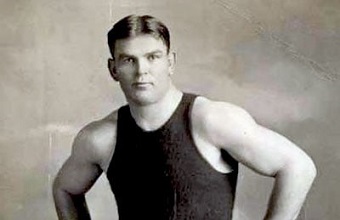Cause of Death : Uremic poisoning.
In the pantheon of professional wrestling legends, few names evoke the spirit of the sport’s origins and the grit of its early days like that of Frank Gotch. Born on April 27, 1877, in Humboldt, Iowa, Frank Alvin Gotch rose from humble beginnings to become a wrestling legend whose legacy endures to this day. As we remember his remarkable life, we delve into the enduring legacy of a wrestler who transcended his era and left an indelible mark on the history of the sport.
Frank Gotch’s journey into professional wrestling began at a time when the sport was in its formative stages. Wrestling in the late 19th and early 20th centuries was vastly different from the polished entertainment spectacle it has become today. Gotch’s rise to prominence was marked by his exceptional physical prowess, technical skills, and the charisma that made him a beloved figure among fans of his era.
One of the defining moments of Gotch’s career came in 1908 when he faced the formidable George Hackenschmidt, known as “The Russian Lion.” The match, often referred to as the “Match of the Century,” pitted two of the era’s most celebrated wrestlers against each other. Gotch’s victory over Hackenschmidt in two straight falls not only solidified his claim as the world champion but also became a milestone in the history of wrestling.
Gotch’s wrestling style was characterized by a combination of strength, technique, and an uncanny ability to adapt to various opponents. He was a master of the catch-as-catch-can style, a form of wrestling that emphasized grappling and holds. His matches were a showcase of technical prowess, and his strategic approach to wrestling elevated the sport to new heights during an era when physicality and skill were paramount.
Frank Gotch’s reputation extended beyond the wrestling ring. He was admired not only for his in-ring abilities but also for his character, sportsmanship, and contributions to the growth of professional wrestling. Gotch’s legacy was rooted in his dedication to the sport and his commitment to preserving its integrity in a time when the line between legitimate competition and entertainment was often blurred.
Following a year of health challenges, Gotch passed away on December 17, 1917 at his residence. Speculation circulated that the cause of death was syphilis, although the confirmed reason was uremic poisoning. He is survived by his wife, Gladys, and their son, Robert Friedrich. The entire family is interred in the Gotch mausoleum located at the Union Cemetery in Humboldt.
The legacy of Frank Gotch, however, was far from forgotten. His impact on professional wrestling reverberated through the decades, influencing generations of wrestlers who followed in his footsteps. Gotch’s dedication to technical excellence and his embodiment of the wrestling spirit served as an inspiration to countless athletes who aspired to achieve greatness in the sport.
Gotch’s legacy is perhaps best encapsulated by his contributions to wrestling’s history and his lasting influence on the sport’s evolution. The legacy of the “Match of the Century” with Hackenschmidt, his commitment to technical excellence, and his unwavering dedication to the craft all contribute to his legendary status.
As the years have passed, Frank Gotch’s name has become synonymous with the essence of wrestling’s roots. He is remembered not only as a champion in the ring but also as a symbol of integrity, determination, and the unyielding spirit of a wrestler. His legacy is a reminder that professional wrestling has a rich history that is built on the foundations laid by pioneers like Gotch.
In the tapestry of wrestling history, Frank Gotch’s legacy remains a testament to the enduring power of a dedicated athlete who defined his era and continues to inspire wrestlers and fans alike. As the wrestling community reflects on his legacy, they honor a man who, through his talent and character, left an everlasting impact on the world of professional wrestling.
